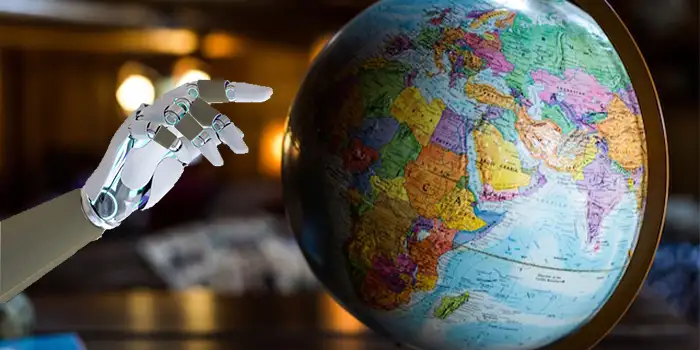I have personally experienced the power of technology and globalization by traveling to many locations and working with different people all around the world. With a simple press of my smartphone, I can connect and cooperate with someone on the opposite side of the planet.
Technology and globalization are about enabling businesses and individuals to collaborate and communicate across geographical and cultural boundaries. This has led to significant advances in fields such as medicine, engineering, and communications. It also breaks down traditional trade barriers and opens up new opportunities for innovation and growth.
In this guide, you’ll learn:
- The relationship between technology and globalization
- Impact of technology on globalization
- Impact of globalization on technology
- Examples of technology and globalization
- What are the challenges of technology and globalization
The relationship between technology and globalization
Technology and globalization are strongly intertwined and have a large influence on one another. Technology is a fundamental driver of globalization. It’s the one who facilitates the movement of people, products, and information across boundaries.
On the other hand, globalization creates demand for new technologies as businesses and individuals seek to connect and communicate across geographical and cultural boundaries.
But how did it all begin? While the foundations of technology and globalization may be traced considerably further back in human history, the first industrial revolution in the late 18th and early 19th centuries was a game changer in the emergence of these two phenomena.
New technologies such as the steam engine, cotton gin, and power loom were invented during the first industrial revolution, which changed the way things were produced and delivered.
This resulted in enormous economic shifts, with old handcraft industries being replaced by large-scale factories and assembly lines.
So here are some examples of how technology and globalization are interconnected:
- People can now interact and work across boundaries like never before thanks to the internet and mobile technology.
- Transportation technology advancements have made it easier and less expensive to carry products and people throughout the world. As a result, global supply networks and international trade have expanded, the same with travel and tourism.
- With the growth of e-commerce and online marketplaces, businesses may now offer items and services to people all over the world.
As you can see, the relationship between technology and globalization is quite complicated and might vary in general.
While technology has facilitated globalization, globalization has also inspired technological innovation and progress.
As the world becomes more interconnected, it is important to consider both opportunities and challenges. It must work towards a future that benefits everyone.
Impact of technology on globalization
The impact of technology on globalization is very big that it has revolutionized the way we do things.
Today, there’s more interconnectedness and interdependence of people and businesses across the world.
The emergence of e-commerce is one example of technology’s impact on globalization.
Internet marketplaces such as Amazon and Alibaba have provided a global platform for businesses to sell and acquire goods, making it simpler for small and medium-sized firms to reach the international market.
Furthermore, the impact of technology on globalization during the Covid-19 pandemic was noticeable.
As we all know, the pandemic has caused unprecedented disruption to the global economy, forcing businesses to adapt to new ways of working and communicating.
Technology played a critical role with the help of virtual meetings and conferences. Since travel restrictions and social distance norms have been established, video conferencing systems such as Zoom and Microsoft Teams have become crucial tools for corporate collaboration.
The impact of technology on globalization especially in empowering people on the poverty line was also there. With the rise of the internet, poor people can now access educational resources and information anywhere at any time.
It allows them to learn new skills and improve their economic opportunities. Online courses, webinars, and tutorials are just a few examples of how technology has expanded access to education for those who may not have the resources to attend traditional schools.
If you want to know which technology has the biggest effect on globalization, well, it is difficult to pinpoint a single technology because every technology has evolved and interacted in complex ways over time to shape globalization as we know it today.
However, some of the technologies that have had a significant impact on globalization include the internet, smartphone, automation, and many more.
Overall, technology had a diverse influence on globalization, with many technologies interacting in complicated ways to shape the global economy and society.
Impact of globalization on technology
The impact of globalization on technology has been significant and far-reaching. Globalization has enabled the cross-border exchange of information, expertise, and resources, allowing scientists and engineers from many nations and regions to collaborate on difficult technical projects.
As a result, sectors such as information technology, biotechnology, and renewable energy have seen fast advancements.
One good example in biotechnology was the human genome project. It was a global scientific cooperation in which researchers and scientists from all over the world map the human genome.
This effort was enabled by technological developments like DNA sequencing and computational biology, and it has had a significant influence on our knowledge of genetics and human health.
The next example we have is one of my favorites which is renewable energy. The globalization of technology influenced the development of renewable energy sources such as solar, wind, and geothermal power.
Global cooperation among scientists, engineers, and politicians, as well as the worldwide need for renewable energy to combat climate change, have fueled advancements in these technologies.
However, globalization has also created new challenges relating to the influence of technology on society and the environment.
The global development of technology has resulted in job displacement, increased income gap, and environmental destruction.
Overall, globalization’s impact on technology has been broad and complicated, having both beneficial and bad consequences for society and the environment.
While globalization has enabled fast technological advancement and the worldwide spread of technology, it has also brought new issues connected to technology’s social and environmental implications.
Examples of technology and globalization
These are some examples of technology and globalization; you are probably already familiar with most of these since you have used some of them.
- Social Media: Social media platforms such as Facebook, Instagram, and Twitter have brought individuals from all over the world together, breaking down traditional communication boundaries and boosting cultural exchange.
- E-commerce: Online marketplaces such as Amazon, eBay, and Alibaba have made it possible to sell products globally and it promotes cross-border trade.
- Cloud Computing: Cloud-based platforms and software have made it possible for organizations to store, process, and exchange data and applications around the globe, promoting collaboration and efficiency.
- Medical Devices: Globalization of medical device manufacturing has resulted in more innovation, lower prices, and greater access to medical technology. Imaging equipment, surgical tools, and prosthetics are currently made in nations all over the world.
- Robotics and Automation: This technology has enabled companies to shift production to countries with lower labor costs and adds to manufacturing’s globalization.
The examples I provided are only a few; there are many more technological advancements that impact our environment today.
What are the challenges of technology and globalization
Technology and Globalization also present some challenges. Here are some examples based on what I’ve observed and on my own experience:
1. Cultural differences and misunderstandings
Globalization allows people from different cultures to interact with each other, which can lead to misunderstandings and conflicts.
For instance, while working in a global team, I have experienced cultural differences in work ethics and communication styles, leading to delays and misunderstandings.
2. Job losses due to automation and outsourcing
Manufacturing globalization has resulted in employment losses in certain nations as production shifts to countries with cheaper labor costs.
This may lead to social and economic instability, which is especially damaging in areas that rely on industrial jobs. I have witnessed this directly in my own country, when a big industry went down, resulting in job losses and an economic downturn.
3. Cybersecurity risks and online privacy
The hazards of cyberattacks and data breaches are increasing as technology continues to develop. These hazards become more prevalent when businesses keep on sharing data across borders.
I’ve seen a lot of news regarding hacks in many businesses on the internet. When vital information is compromised, it may create a loss of confidence and even financial hardship.
4. Environmental impact
The impact of technology and globalization on the environment is a major concern. The globalization of the economy has increased the cross-border transportation of goods and services, then it resulted in a considerable increase in carbon emissions.
The rising usage of electronic gadgets and data centers has also contributed to this problem, with more energy consumption and a larger carbon impact.
5. Unequal distribution of benefits of globalization
The uneven distribution of benefits is one of the major concerns of technology and globalization.
The best example of this is the outsourcing of jobs from developed countries to poor countries. As businesses profit from lower labor costs, employees in developed nations lose their jobs and struggle to find new jobs.
Final Thoughts
To recap, technology and globalization have resulted in significant changes and opportunities in our lives.
It includes communication, education, health, and business. But, we must equally acknowledge that there are obstacles to its progress. Issues such as environmental effects and unequal distribution of benefits, which I previously mentioned.










